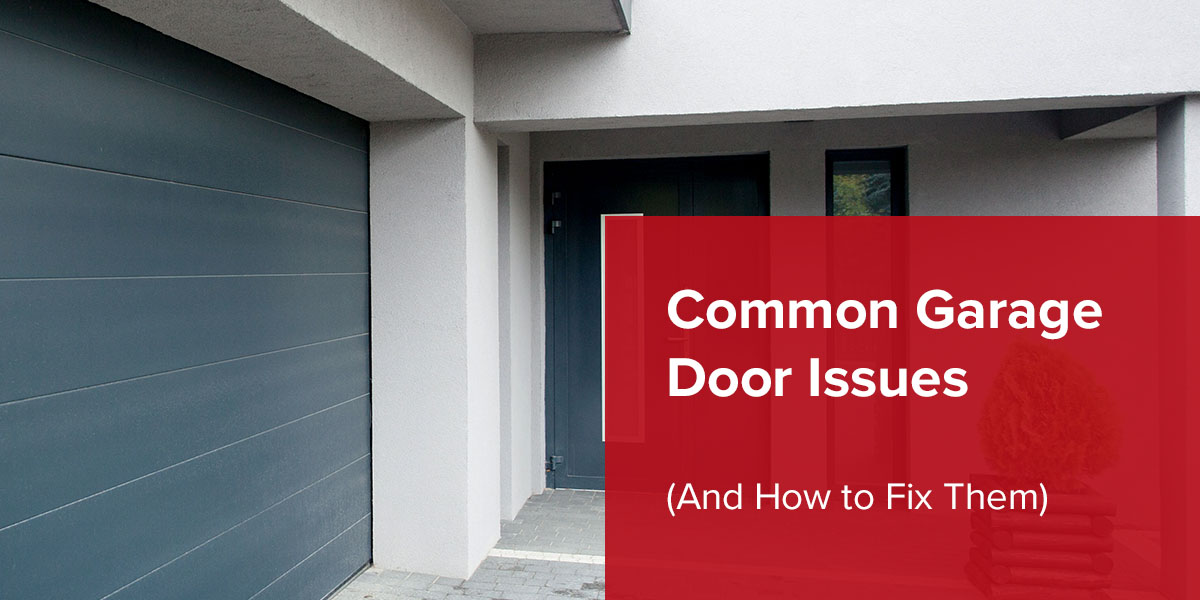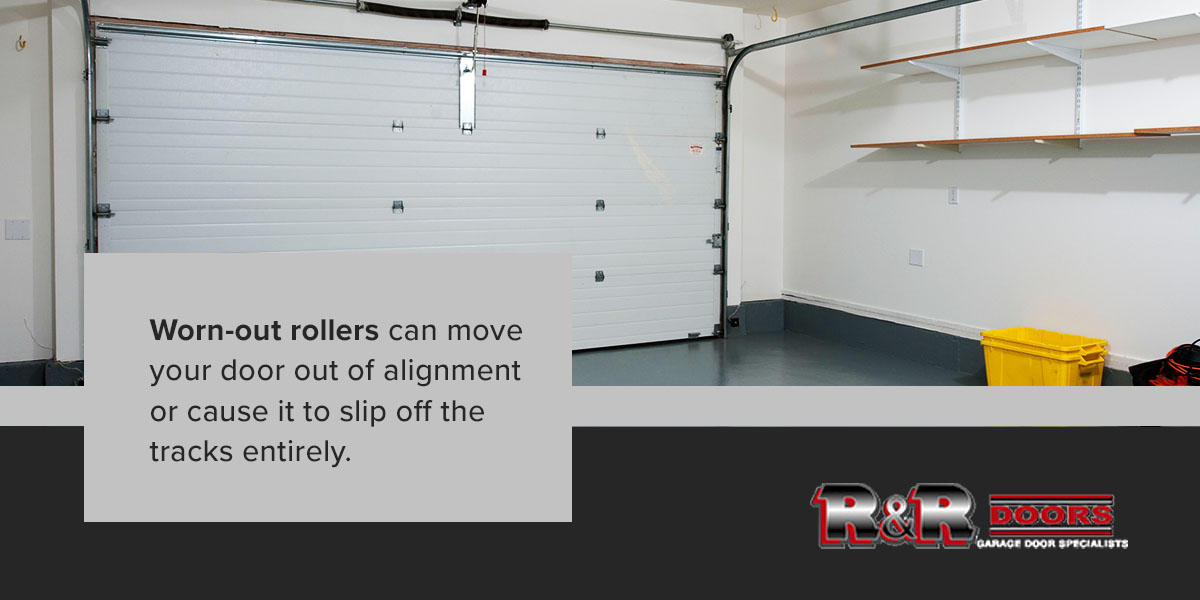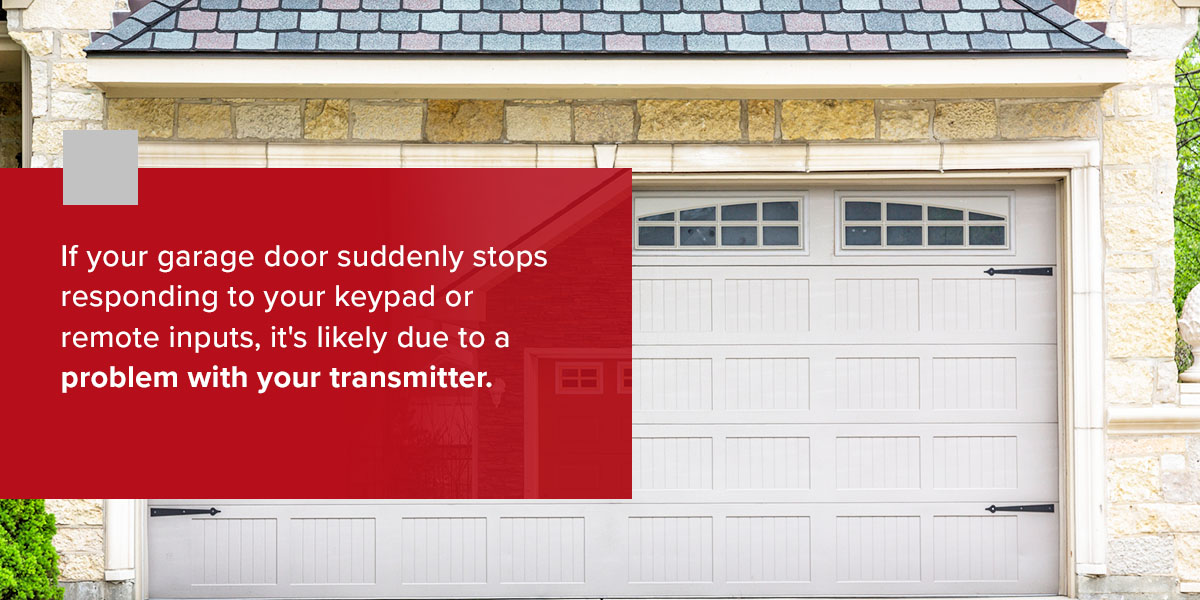
Garage doors are complex systems, so it can be tough to figure out what to do when something goes wrong.
If you’re experiencing any of the following issues, you’re in luck. This guide will help you diagnose some of the most common garage door problems and provide easy solutions.
Table of Contents
1. Dying Door Opener
Typically, garage door openers start declining after 10 to 15 years — you’ll know it’s time to replace yours if you notice any of these signs:
- The door opens and closes by itself.
- The door is slow to respond or moves sluggishly.
- The door opener vibrates.
- Strange noises come from the opener.
- The garage door sags.
- The door partially opens and reverses direction.
If you notice any of the above, your best bet is to have a certified professional replace your garage door opener right away.
2. Door Does Not Close
If you’re like most homeowners, you’ve got a lot of valuable items in your garage — so you’re facing a major issue if your door consistently stops short of closing.
There are several reasons your door might not close all the way:
- Bent tracks: If the tracks or rollers get bent during operation, the door won’t be able to travel all the way to its closing position. While you may be able to repair the damage, replacing your tracks or rollers is a more permanent solution.
- Blockages: Debris blocking the door tracks or rollers can stop the door from closing. Removing the blockage and greasing the rollers with a silicone-based lubricant should solve the issue.
- Screw placement: The limit adjustment screws on the opener control how far the door needs to travel before closing. When these screws are placed too high, they can prevent the door from closing all the way. You can typically solve this problem yourself with a screwdriver.
If none of the above seem to be the issue, it’s a good idea to call a reliable garage door services company.
3. Old or Rusted Rollers

Worn-out rollers can move your door out of alignment or cause it to slip off the tracks entirely. If this happens, you might notice a screeching or squeaking sound.
The life span of your rollers will vary depending on the type you have. Steel and nylon rollers last a long time, so you may just need to lubricate the ball bearings to solve the problem.
However, because plastic rollers operate without ball bearings, they wear down more quickly and require replacement approximately every two years.
4. Off-Balance Door
When garage doors fall out of alignment, it’s usually the result of other issues like:
- Excess weight: Adding weight to your door after installation can cause it to become unbalanced.
- Drive issues: Problematic drive systems can cause the door to shake and slip, throwing it off balance.
- Broken or aging springs: Garage door springs loosen as they age, which can cause one side of the door to raise faster than the other.
You’ll want to take care of this issue as soon as possible, as leaving it for too long can cause the torsion springs to snap. Common signs of an unbalanced garage door include:
- Slow response time
- Closing even after being manually opened
- Complete failure to open
- An uneven appearance
- Banging, scraping or popping noises
To make sure you’re dealing with an off-balance door, cut the power supply and manually lift the door before slowly releasing it. If it slips out of position or slams shut, it’s time to call a professional.
Contact Us For Your Garage Door Issues
5. Abnormal Noises
As mechanical systems, garage doors naturally make some noise when you use them. However, it’s important to pay attention when you hear something out of the ordinary.
Slapping, grinding, squeaking, vibrating or rattling noises usually indicate it’s time for maintenance or repair. Although you may not be dealing with anything too serious, scheduling an appointment sooner rather than later is the best way to prevent bigger issues from developing.
If you hear any of the following sounds, though, your garage door might be experiencing a more serious issue:
- Thumping or banging
- Straining
- Rumbling
- Scraping
- Clinking
The best plan of action here is to call a professional to diagnose and fix the issue as soon as possible. Leaving this kind of problem for too long could damage your home.
6. Keypad or Remote Issues
If your garage door suddenly stops responding to your keypad or remote inputs, it’s likely due to a problem with your transmitter. Fortunately, these issues are usually easy to fix.
The most likely cause is a dead battery. Remove the old battery from your remote control or keypad and replace it with a new one, then try opening your door. It should open as usual.
It’s also possible that the issue is the result of a blocked sensor or faulty antenna. Check to make sure nothing is in front of the photo-eye sensors, and confirm that the keypad antenna is pointing directly downward.
If neither of those steps works, you might need to replace the device entirely. Look for a model that’s compatible with your existing door and closely follow the manufacturer’s programming instructions.

7. Sensor Issues
Malfunctioning sensors are one of the most common garage door repair problems people experience. Some of the usual causes include:
- Misaligned sensors: A blinking red light means the sensor is out of alignment. You can usually realign your sensors by gently adjusting them until the red light stops blinking.
- Sun interference: The sun’s rays can also interfere with sensor alignment — you’ll typically only notice this problem at certain times of day. Try shielding the affected sensors with a piece of cardboard or tarp, making sure to keep the light beams clear.
- Power supply issues: If you notice that one or both lights on your sensors are dark, you may have lost power. Ensure the system is plugged in first, then check to see if a power outage or blown fuse is causing the issue.
- Dirty sensors: Water and dust can block sensor signals, preventing your doors from moving. Try cleaning your sensors with a dry, lint-free cloth to see if it restores the signal.
While you can usually resolve sensor issues yourself, it’s still best to bring in an experienced professional if you think you’re dealing with a more serious problem.
Repair or Replace Your Garage Door With R&R Doors
Are you a Wisconsin homeowner experiencing garage door issues? The specialists at R&R Doors are here to help. Whether you need a simple track repair or a brand new door, you can count on us to get it done.
Contact us today to schedule a service appointment or request a free estimate on any of our garage doors.
